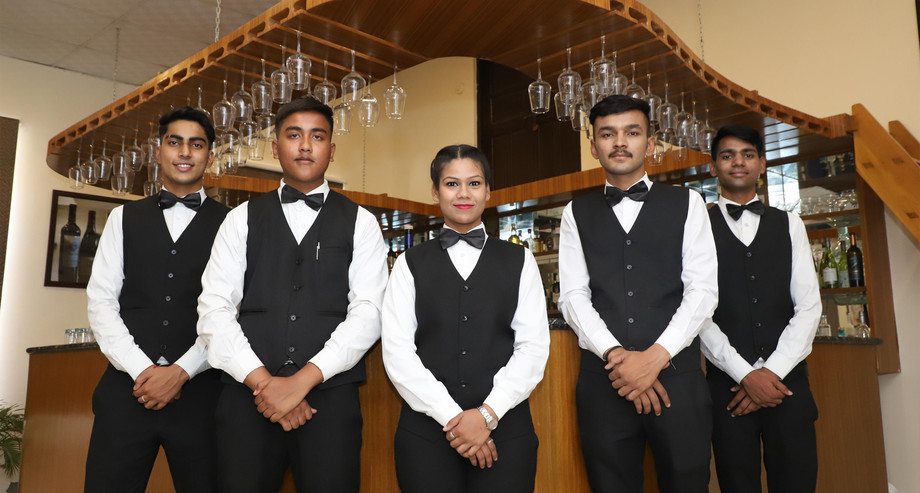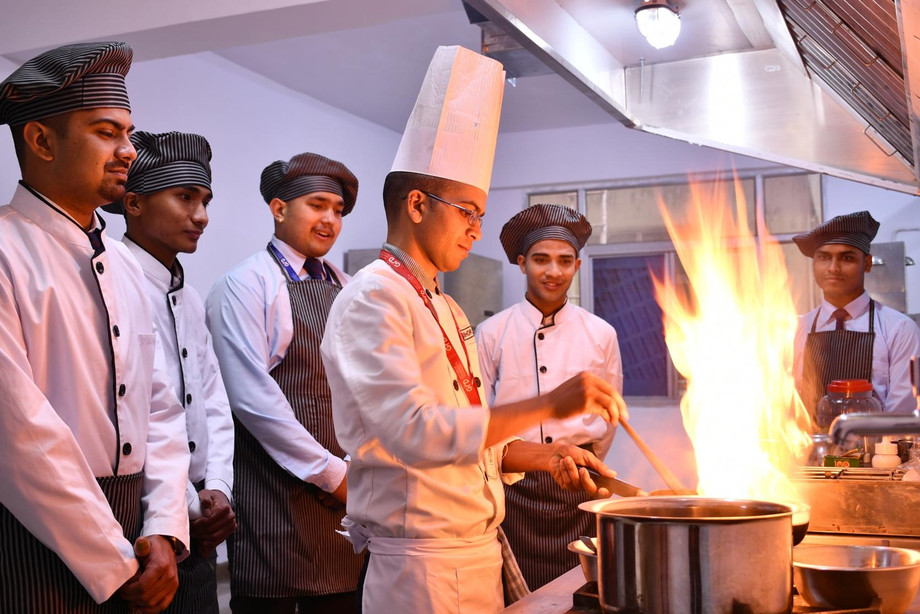UIHM's blog
In today's dynamic job market, acquiring the right skills and knowledge is essential for personal and professional growth. One avenue that has gained immense popularity is hospitality education, particularly courses like the diploma in hotel management in Udaipur. These programs not only provide technical expertise but also foster personal development, shaping individuals into well-rounded professionals capable of thriving in diverse environments.
The Rise of Hospitality EducationThe hospitality industry is a vast and ever-expanding field, encompassing hotels, restaurants, event management, tourism, and more. With globalization and technological advancements, the demand for skilled professionals in this sector has surged. Recognizing this trend, educational institutions worldwide have introduced specialized programs like the hotel management course in Udaipur to cater to aspiring individuals.
Hospitality education goes beyond traditional classroom learning. It combines theoretical knowledge with practical training, allowing students to gain hands-on experience in real-world scenarios. This holistic approach equips them with the skills necessary to excel in various roles within the industry. Moreover, the curriculum often includes modules on communication, leadership, and customer service, fostering essential soft skills vital for success in any profession.
Personal Growth Through Hospitality EducationOne of the most significant benefits of undertaking a diploma in hotel management in Udaipuror similar programs is the personal growth it facilitates. The rigorous training and exposure to diverse cultures and environments broaden students' perspectives, instilling in them empathy, adaptability, and cultural sensitivity.
Furthermore, working in hospitality requires individuals to interact with people from different backgrounds on a daily basis. This constant engagement hones their interpersonal skills, teaching them the art of effective communication, conflict resolution, and teamwork. Such experiences not only enhance their professional competence but also contribute to their personal development, making them more confident and socially adept individuals.
Moreover, hospitality education emphasizes the importance of resilience and problem-solving. In a fast-paced industry where challenges are inevitable, students learn to think on their feet and devise creative solutions to overcome obstacles. These skills are invaluable not only in their careers but also in their personal lives, empowering them to tackle any situation with confidence and grace.
Career Opportunities and BeyondCompleting a hotel management course in Udaipuropens up a plethora of career opportunities for individuals. Graduates can pursue diverse roles such as hotel managers, event planners, cruise directors, or culinary experts, depending on their interests and strengths. Moreover, the global nature of the hospitality industry means that professionals are not confined to a single location but can explore job prospects worldwide.
However, the benefits of hospitality education extend beyond career prospects. It instills in individuals a sense of responsibility towards society and the environment. Many programs incorporate modules on sustainability and corporate social responsibility, urging students to become ethical leaders committed to making a positive impact on the world.
In conclusion, hospitality education plays a pivotal role in shaping individuals for success. Through a combination of practical training, soft skill development, and personal growth opportunities, these programs empower students to excel in their careers and become responsible global citizens. Whether pursuing a diploma in hotel management in Udaipur or similar courses elsewhere, individuals embarking on this journey can expect a transformative experience that will shape their personalities for years to come.
In the dynamic world of aviation, the roles of air hostesses and cabin crew members are often mistakenly used interchangeably. However, they encompass distinct responsibilities and skill sets that cater to different aspects of ensuring a safe and pleasant flight experience. Let's delve into the nuances of each role, shedding light on their unique characteristics and the pathways to pursuing them.
Understanding Air Hostess WorkAir hostesses, also known as flight attendants, are primarily responsible for ensuring the comfort, safety, and well-being of passengers during flights. Their duties range from greeting passengers as they board, assisting with luggage, demonstrating safety procedures, serving meals and beverages, to addressing any passenger concerns or emergencies that may arise during the flight. Beyond these operational tasks, air hostesses play a crucial role in maintaining a positive atmosphere onboard, providing excellent customer service, and enhancing the overall passenger experience.
To excel in this role, individuals often undergo rigorous training programs that equip them with the necessary skills and knowledge. These programs cover various aspects such as emergency procedures, first aid, customer service, and aircraft-specific protocols. Aspiring air hostesses can pursue specialized courses, such as the Flight Stewards course in Udaipur, offered by reputable institutions like Hotel Management College in Udaipur, to kickstart their careers in the aviation industry.
Differentiating Cabin Crew Staff TrainingCabin crew members encompass a broader category that includes not only air hostesses but also other personnel involved in ensuring the smooth operation of flights. While air hostesses focus primarily on passenger service and safety, cabin crew members have additional responsibilities related to aircraft operations, security, and emergency preparedness. This distinction highlights the diverse skill sets required within the cabin crew team.
Cabin crew staff training programs cover a wide range of topics, including aircraft systems, emergency evacuation procedures, conflict resolution, and cultural sensitivity. These programs aim to prepare individuals for the multifaceted nature of their roles, equipping them with the knowledge and skills needed to handle various scenarios effectively.
Navigating the Differences Between Air Hostess and Cabin CrewWhile both air hostesses and cabin crew members share the common goal of ensuring the safety and comfort of passengers, their roles diverge in terms of focus and responsibilities. Air hostesses primarily focus on passenger service and satisfaction, whereas cabin crew members have a broader scope that encompasses operational and safety aspects of flight.
Understanding these differences is crucial for individuals aspiring to pursue careers in the aviation industry. Whether enrolling in a Flight Stewards course in Udaipuror seeking opportunities for cabin crew staff training, it's essential to align one's skills and interests with the specific requirements of each role.
Exploring Career OpportunitiesFor those passionate about hospitality, customer service, and adventure, a career as an air hostess or cabin crew member offers a unique blend of excitement and fulfillment. By enrolling in reputable training programs, such as those offered by Hotel Management College in Udaipur, individuals can acquire the necessary skills and knowledge to embark on this rewarding career path.
Moreover, the aviation industry continues to evolve, offering diverse opportunities for career growth and advancement. Whether working for commercial airlines, private charters, or international carriers, air hostesses and cabin crew members play integral roles in ensuring the smooth operation of flights and the satisfaction of passengers worldwide.
In conclusion, while the terms "air hostess" and "cabin crew" are often used interchangeably, they represent distinct roles within the aviation industry. Understanding the differences between these roles and the specialized training required for each is essential for aspiring professionals seeking to pursue careers in this dynamic field. By exploring the variances between air hostesses and cabin crew members, individuals can make informed decisions about their career paths and embark on exciting journeys in the world of aviation.
In the dynamic world of hospitality, effective hotel management is paramount for success. Whether you're a seasoned hotelier or aspiring to venture into the industry, mastering management skills is essential. Here's your comprehensive guide to elevating your hotel management prowess with 11 expert tips.
1. Cultivating Leadership ExcellenceEffective hotel management begins with strong leadership. Nurture leadership qualities such as communication, decision-making, and problem-solving. A degree in hotel management in Udaipurcan provide a solid foundation for aspiring leaders.
2. Embracing Continuous LearningIn the ever-evolving hospitality landscape, staying updated is crucial. Enroll in hotel management courses in Udaipurto enhance your skills and stay abreast of industry trends and best practices.
3. Prioritizing Guest Satisfaction
At the heart of hotel management lies guest satisfaction. Ensure seamless experiences for guests by prioritizing their needs and preferences. Personalization and attentive service leave a lasting impression.
4. Streamlining Operations EfficiencyEfficient operations are the backbone of successful hotels. Implement streamlined processes and utilize technology to optimize efficiency. From reservations to housekeeping, every aspect should function smoothly.
5. Harnessing the Power of TechnologyEmbrace technology to enhance guest experiences and streamline operations. Utilize hotel management software for tasks like reservations, inventory management, and guest communication. Stay ahead in the digital age.
6. Fostering a Positive Work CultureA positive work environment fosters productivity and employee satisfaction. Cultivate a culture of respect, recognition, and open communication among staff. Happy employees translate to happy guests.
7. Effective Revenue Management StrategiesMaximize revenue through strategic pricing and inventory management. Implement dynamic pricing strategies and leverage data analytics to make informed decisions. Balance profitability with guest value.
8. Sustainability and Environmental ResponsibilityIncorporate sustainable practices into hotel operations. From energy-efficient lighting to waste reduction initiatives, prioritize environmental responsibility. Eco-conscious practices resonate with modern travelers.
9. Crisis Management PreparednessBe prepared to handle unforeseen challenges effectively. Develop comprehensive crisis management plans covering scenarios like natural disasters, pandemics, or security threats. Swift and decisive action is key in mitigating risks.
10. Continuous Feedback and ImprovementSeek feedback from guests and staff to identify areas for improvement. Embrace constructive criticism as an opportunity to refine services and operations. Continuous improvement is vital for staying competitive.
11. Community Engagement and Social ResponsibilityEngage with the local community and contribute positively to society. Support local initiatives, charities, and sustainability projects. Building strong community relationships enhances the hotel's reputation and fosters goodwill.
In conclusion, mastering hotel management requires a multifaceted approach encompassing leadership, efficiency, guest satisfaction, and social responsibility. By implementing these expert tips and continuously refining your skills, you can excel in the dynamic world of hospitality. Start your journey towards excellence in hotel management today!
In the heart of Udaipur, India, a city renowned for its majestic palaces, rich heritage, and stunning lakes, lies a gem in the realm of hospitality education: the Udaipur Hotel Management Course. This institution epitomizes the essence of world-class training in international hotel management programs in India, offering students an unparalleled opportunity to delve into the intricacies of hospitality management on a global scale.
Cultivating Global PerspectivesAt the core of international hotel management courses like those offered in Udaipur lies the cultivation of global perspectives. Aspiring hoteliers embark on a journey that transcends geographical boundaries, immersing themselves in diverse cultures, traditions, and hospitality practices from around the world. Through experiential learning and cross-cultural interactions, students gain invaluable insights into the dynamics of the international hospitality industry.
Experiential Learning: Bridging Theory and PracticeThe hallmark of top-tier hotel management programs is their emphasis on experiential learning. From hands-on training in state-of-the-art facilities to internships at renowned hotels and resorts worldwide, students are equipped with the practical skills and industry knowledge necessary to excel in the competitive hospitality landscape. In Udaipur hotel management courses, students have the opportunity to work alongside seasoned professionals, honing their craft and mastering the art of hospitality service.
Innovative Curriculum: Navigating Industry TrendsIn an ever-evolving industry, staying abreast of emerging trends and innovations is paramount. International hotel management programs leverage cutting-edge curriculum frameworks designed to equip students with the skills and expertise needed to navigate the dynamic landscape of hospitality. From sustainability initiatives to digital marketing strategies, the curriculum encompasses a wide array of topics tailored to meet the demands of today's global hospitality sector.
Cultivating Leadership ExcellenceLeadership lies at the heart of successful hotel management, and international programs place a strong emphasis on cultivating leadership excellence among students. Through mentorship programs, leadership workshops, and real-world case studies, aspiring hoteliers develop the vision, strategic acumen, and interpersonal skills required to lead teams and drive organizational success. In Udaipur hotel management courses, students are empowered to become visionary leaders who inspire innovation and excellence in the world of hospitality.
Embracing Diversity and InclusionIn a multicultural industry like hospitality, diversity and inclusion are not just buzzwords but fundamental principles that shape organizational culture and foster creativity. International hotel management programs foster an inclusive learning environment where students from diverse backgrounds come together to share perspectives, exchange ideas, and celebrate cultural differences. By embracing diversity, students gain a deeper understanding of global hospitality practices and develop the cultural competence needed to thrive in a multicultural workplace.
Preparing for Industry SuccessUltimately, the goal of international hotel management programs is to prepare students for success in the global hospitality arena. Whether aspiring to become hotel managers, event planners, or hospitality entrepreneurs, graduates of these programs emerge as versatile professionals equipped with the skills, knowledge, and networks needed to excel in their chosen career paths. With a strong foundation in hospitality management and a global mindset, graduates of Udaipur hotel management courses are poised to make a meaningful impact in the world of hospitality.
ConclusionIn conclusion, world-class training in international hotel management programs, such as those offered in Udaipur, represents a gateway to a dynamic and rewarding career in the global hospitality industry. Through experiential learning, innovative curriculum, and a commitment to diversity and inclusion, these programs empower students to become leaders and innovators in the world of hospitality. As the demand for skilled hospitality professionals continues to rise, investing in a comprehensive education in international hotel management is not just a pathway to success—it's a journey of exploration, discovery, and transformation.
In the bustling city of Udaipur, nestled in the culturally rich state of Rajasthan, lies a golden opportunity for individuals aspiring to excel in the dynamic world of hospitality. The degree in Hotel Management course in Udaipuroffers a gateway to a fulfilling career path filled with endless possibilities. From mastering the art of hospitality to honing crucial management skills, embarking on this educational journey unlocks a myriad of benefits that extend far beyond the classroom.
Understanding Hotel Management:Hotel management encompasses a diverse range of services aimed at delivering exceptional guest experiences while ensuring operational efficiency. It involves the seamless coordination of various departments such as housekeeping, front office, food and beverage, and administration to uphold the standards of quality and service excellence.
Exploring the Benefits:One of the primary benefits of pursuing a degree in Hotel Management is the comprehensive understanding of industry-specific concepts and practices. Through specialized coursework, students gain insights into various aspects of hotel operations, including revenue management, customer service strategies, and marketing techniques tailored to the hospitality sector.
Practical Skill Development:
Beyond theoretical knowledge, hotel management courses emphasize practical skill development through hands-on training and industry exposure. Students have the opportunity to engage in internships, workshops, and simulated scenarios that simulate real-world challenges, preparing them to thrive in dynamic hotel environments.
Navigating Career Opportunities:The benefits of a hotel management degree extend to a wide array of career opportunities spanning the hospitality industry. Graduates can pursue roles in hotel operations, event management, resort administration, and even venture into entrepreneurship by establishing their own hospitality ventures. The versatility of skills acquired through the course equips individuals to adapt to diverse roles and responsibilities within the sector.
Embracing Innovation:In an era characterized by rapid technological advancements, the field of hotel management continuously evolves to embrace innovation and digitalization. Students enrolled in hotel management courses gain exposure to cutting-edge technologies and software applications used in hotel operations and guest services. This proficiency in technology equips them with a competitive edge in the job market, enabling them to drive efficiency and innovation within hospitality organizations.
Cultural and Regional Context:The allure of studying hotel management in Rajasthanlies in its rich cultural heritage and vibrant hospitality traditions. Students not only learn the intricacies of hotel management but also immerse themselves in the cultural tapestry of Rajasthan, gaining valuable insights into regional customs, cuisines, and hospitality practices unique to the area.
Networking and Industry Connections:Hotel management courses serve as networking hubs, facilitating interactions with industry professionals, guest speakers, and alumni networks. These connections provide invaluable insights, mentorship opportunities, and potential career pathways for aspiring hoteliers, fostering a supportive ecosystem that nurtures professional growth and development.
Holistic Approach to Service Excellence:Beyond the operational aspects, hotel management courses instill a commitment to service excellence and guest satisfaction. Students learn the importance of cultivating positive guest experiences through personalized attention, attention to detail, and effective communication. These soft skills are instrumental in fostering lasting relationships with guests and enhancing the reputation of hospitality establishments.
Sustainability and Environmental Awareness:In response to global sustainability challenges, hotel management courses incorporate modules on environmental conservation, resource management, and sustainable practices within the hospitality industry. Students are encouraged to adopt eco-friendly initiatives and explore innovative solutions to minimize environmental impact while delivering exceptional guest experiences.
Conclusion:In conclusion, the benefits of pursuing a hotel management course in Udaipur extend far beyond acquiring a degree. From comprehensive skill development to industry immersion and cultural enrichment, this educational journey prepares individuals to thrive in the dynamic world of hospitality. Aspiring hoteliers embarking on this path not only elevate their careers but also contribute to the continuous evolution and innovation of the hospitality sector, ensuring memorable experiences for guests and sustainable growth for the industry as a whole.





